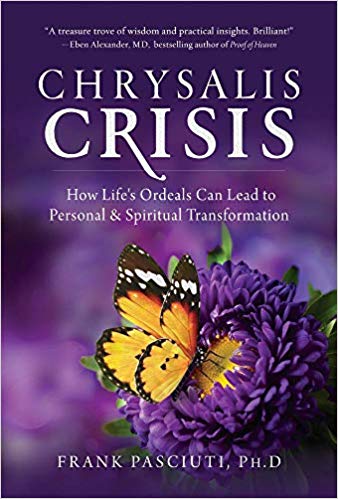
I was asked to write up a blurb for the upcoming Rhine Friday night talks to make it interesting and compelling for people to attend. I did well enough to compel myself to purchase and read the book before the author has even taken to the lectern. Dr. Pasciuti is a Jungian Transpersonal Psychologist who is also a psychic experiencer. His book on personal growth through crises goes beyond the day-to-day issues we all must weather to those of a supernatural (psychic) type. I haven’t read many self-help books nor have I read many psychology texts other than those I was assigned in college (and other programs) so I cannot say for certain that other psychologists have not delved into supernatural subject matter. However, the predominant philosophy out there is that supernatural events are simply impossible and must be reduced to the workings of the brain. I disagree of course, and my fervent desire in writing for this blog and my series of books about Callie O’Callahan is to teach others that their supernatural experiences do not automatically make them insane.
The book is written in layers, the first section dealing with topical matters of life and difficulties that we all share with subsequent sections delving deeper into more personal levels of development. The sections regarding spirituality are where the supernatural phenomena are handled quite deftly. In our predominantly Christian materialist society, many psychic phenomena can lead people to a spiritual crisis especially if it happens only once or a very few times. We do not teach people in our Western philosophy how to deal with apparitions, telepathy, psychokinesis or precognition because it isn’t supposed to happen…yet it does happen…to so many people. Dr. Pasciuti handles the psychic subject with care, because this book is for a broad audience, by using personal and client experiences as examples and bringing across the most current hypothesis for psi in his section called “Sit Lightly in the Saddle of Belief”. Instead of beating us up with dogmatic belief systems, he weaves psi experiences in gently and carefully with the other issues that might cause us existential crises.
His client Dawn exemplifies the expansion of human consciousness once the ten key areas of human development have been examined. The author’s experience both with clients and his own path has led him to believe that this is possible for everyone to attain. Besides recognizing the ten key areas, it is important to reveal those aspects we are unaware of called Shadow Areas. Some people may still be dealing with issues from a past life which can be revealed through regression therapy if done properly by a skilled therapist. Time in quiet contemplation, meditation, ascetic practices, breathing exercises or even running or biking for miles can aid in opening up the brain to the mind and the mind to Consciousness.
I am a Taoist by philosophy which means I do not follow any religious belief system. It also means that I do not try to understand God (The Tao is unknowable). Wow does that free up your mind. Anyway, I also view life through Yin and Yang: all things have light and dark, constructive and destructive, positive and negative, the flow of Yin and Yang determine how much of one or the other prevails. A third aspect is Wu Wei or be like water: it flows over or around obstacles and conforms to its environment. I also look at many different philosophies and choose aspects that work for me and throw away the rest. Reaching an enlightened state where the mind touches the Consciousness of which we are all a part is a personal journey that is different for everyone. This book is not a self-help book that will guide you step-by-step through a process, rather, it discusses those areas that can hold us back from our true potential if we do not recognize them and try to balance them.
